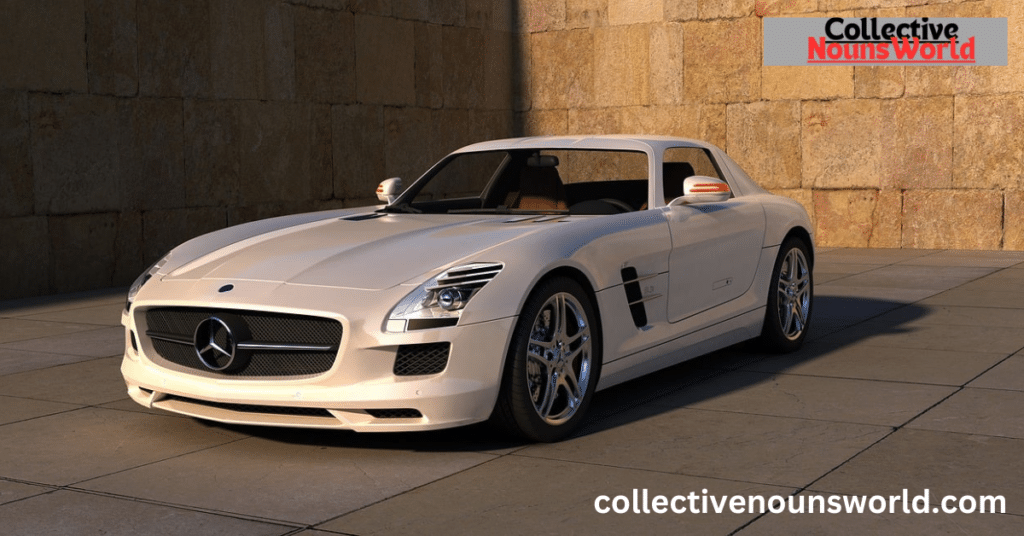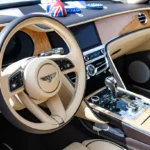Have you ever wondered what to call a group of cars zooming down the highway? Or a cluster of boats bobbing in the harbor? Welcome to the fascinating world of collective nouns for vehicles.
These special terms not only add color to our language but also help us describe groups of vehicles with precision and flair. In this comprehensive guide, we’ll explore the various collective nouns used for different types of vehicles, their origins, and how they’re used in everyday life.
The Universal Collective: Fleet
When it comes to collective nouns for vehicles, “fleet” is the jack-of-all-trades. It’s versatile enough to describe a group of almost any type of vehicle, but it’s most commonly associated with cars and ships.
Origins and Evolution of “Fleet”
The term “fleet” has nautical roots, originating from the Old English word “flēot,” meaning a ship or shipping company. Over time, its use expanded to include other types of vehicles.
When and How to Use “Fleet”
You’ll often hear “fleet” used in these contexts:
- Business: Companies with multiple vehicles often refer to them as a fleet. For example, “UPS manages a fleet of over 100,000 vehicles.”
- Government: “The city’s fleet of police cars underwent maintenance last month.”
- Military: “The Air Force’s fleet of F-22 Raptors is considered the most advanced in the world.”
Real-world Examples
| Organization | Fleet Size | Vehicle Types |
| FedEx | 180,000+ | Delivery trucks, vans, aircraft |
| Uber | 3 million+ | Cars (driver-owned) |
| US Navy | 490+ | Ships, submarines, aircraft |
On the Road: Collective Nouns for Land Vehicles
While “fleet” is the catch-all term, specific types of land vehicles have their own unique collective nouns.
Cars and Trucks
- Traffic: The urban jungle’s pulse
- “The morning traffic crawled along the highway.”
- Convoy: More than just a military term
- “A convoy of trucks delivered emergency supplies to the disaster area.”
- Cavalcade: When vehicles become a spectacle
- “A cavalcade of classic cars paraded down Main Street during the festival.”
“Nothing exemplifies freedom like a convoy of trucks rolling down the open road.” – Anonymous Trucker
Motorcycles and Bikes
- Gang: Not just for tough guys
- “A gang of motorcycles roared past, their engines echoing off the canyon walls.”
- Rally: When two wheels take over
- “The annual bicycle rally brought thousands of cyclists to the city.”
Case Study: The Sturgis Motorcycle Rally Every year, the small town of Sturgis, South Dakota, hosts one of the largest motorcycle rallies in the world. In 2015, the 75th anniversary event attracted over 739,000 vehicles, creating a massive “gang” of motorcycles that transformed the town for ten days.
Buses and Public Transport
- Line: More than just waiting your turn
- “A line of school buses waited to pick up students after the big game.”
- Fleet: Organization on a grand scale
- “The city’s fleet of electric buses has reduced carbon emissions by 30%.”
Sailing the Seas: Maritime Collective Nouns
The nautical world has some of the most colorful and historically rich collective nouns for vehicles.
Ships and Boats
- Armada: From Spanish roots to modern usage
- Originally referring to the Spanish fleet that attempted to invade England in 1588, “armada” now describes any large fleet of ships.
- “An armada of cruise ships sailed into the harbor for the festival.”
- Flotilla: Small but mighty gatherings
- “A flotilla of fishing boats set out at dawn to catch the day’s haul.”
Specialized Terms
- Navy: More than just a military branch
- “The merchant navy plays a crucial role in global trade.”
- Regatta: When boats compete
- “The annual regatta brought together a colorful array of sailboats from across the region.”
Fun Fact: The largest armada in history was the Allied invasion fleet of D-Day in World War II, comprising over 5,000 vessels.
Learn more about What is the Collective Noun for Cards?
Taking to the Skies: Aerial Collective Nouns
As we soar into the realm of aerial vehicles, we encounter some unique and evocative collective nouns.
Airplanes and Jets
- Squadron: Precision in formation
- Military usage: “A squadron of fighter jets performed a flyover during the national celebration.”
- Civilian usage: “The airline added a new squadron of fuel-efficient aircraft to its fleet.”
- Flight: From birds to Boeing
- “A flight of passenger planes lined up on the runway, ready for takeoff.”
Helicopters and Smaller Aircraft
- Swarm: The buzz of rotors
- “A swarm of news helicopters hovered over the scene of the event.”
- Fleet: Versatility in the air
- “The coast guard’s fleet of helicopters conducts regular patrols along the shoreline.”
The Road Less Traveled: Unusual Collective Nouns
Language is always evolving, and creative minds have coined some unconventional collective nouns for vehicles:
- Jam: When vehicles stand still
- “The accident caused a jam of cars stretching for miles.”
- Clutter: A mess of vehicles
- “A clutter of abandoned cars filled the old junkyard.”
- Gaggle: Not just for geese anymore
- “A gaggle of scooters zipped through the narrow city streets.”
Learn more about What Is a Simple Predicate? A Clear and Easy Explanation
Driving Change: Evolving Terminology
As technology reshapes the automotive landscape, new collective nouns are emerging to describe modern vehicle groups.
Impact of Technology on Vehicle Collective Nouns
- Pod: For self-driving cars
- “A pod of autonomous vehicles communicated wirelessly to navigate the complex intersection.”
- Swarm: Drone formations
- “A swarm of delivery drones departed from the warehouse, each headed to a different destination.”
Industry-specific Terms and Their Crossover Potential
- Platoon: Used in the trucking industry for closely-spaced, partially automated truck convoys.
- “A platoon of semi-trucks used vehicle-to-vehicle communication to maintain safe distances while conserving fuel.”
Global Gears: Cultural Variations in Vehicle Collective Nouns
Just as vehicles vary around the world, so do the terms used to describe them in groups.
Regional Differences and Local Flavors
- UK: “A queue of cars” instead of “line of cars”
- Australia: “A mob of utes” (utility vehicles)
- India: “A jam of auto-rickshaws”
How Different Languages Approach Vehicle Groups
| Language | Term | Literal Translation | Used For |
| French | Une flotte | A fleet | Cars, ships |
| German | Eine Kolonne | A column | Vehicles in a line |
| Japanese | 車列 (sharetsu) | Car column | Line of cars |
| Spanish | Una caravana | A caravan | Line of vehicles |
The Practical Lane: Using Collective Nouns Effectively
Understanding and using the right collective nouns for vehicles isn’t just a matter of linguistic curiosity—it has practical applications across various fields.
In Journalism and Reporting
Precise language helps paint a clear picture for readers or viewers:
- “A convoy of aid trucks crossed the border, bringing much-needed supplies.”
- “The fleet of electric buses has reduced the city’s carbon emissions by 15% in the first year.”
Logistics and Fleet Management
In the business world, using the right terms ensures clear communication:
- “Our fleet of delivery vans covers over 1 million miles annually.”
- “The line of trucks at the port has caused delays in shipment processing.”
Creative Writing and Storytelling
The right collective noun can add flavor and imagery to your writing:
- “A cavalcade of vintage cars rumbled down Main Street, a rolling museum of automotive history.”
- “The armada of fishing boats set out at dawn, a forest of masts silhouetted against the rising sun.”
Conclusion: The Road Ahead for Vehicle Collective Nouns
As our modes of transportation continue to evolve, so too will the language we use to describe them. From the traditional fleet of cars to the futuristic swarm of drones, collective nouns for vehicles reflect our changing relationship with transportation.
Whether you’re managing a taxi fleet, organizing a bike rally, or simply describing the morning traffic, understanding these terms adds precision and color to your language. So the next time you see a group of vehicles, take a moment to consider: what’s the perfect collective noun for this particular assemblage?
Remember, language is a living thing, constantly in motion—just like the vehicles we use these terms to describe. Who knows? You might even coin the next popular collective noun for the vehicles of tomorrow.

Luna Jasper is an experienced blogger with a passion for language and grammar. At **Collective Nouns World**, she shares her expertise in exploring the fascinating world of collective nouns, making learning both engaging and fun. With years of writing and research under her belt, Luna’s insightful articles help readers understand and appreciate the English language.







